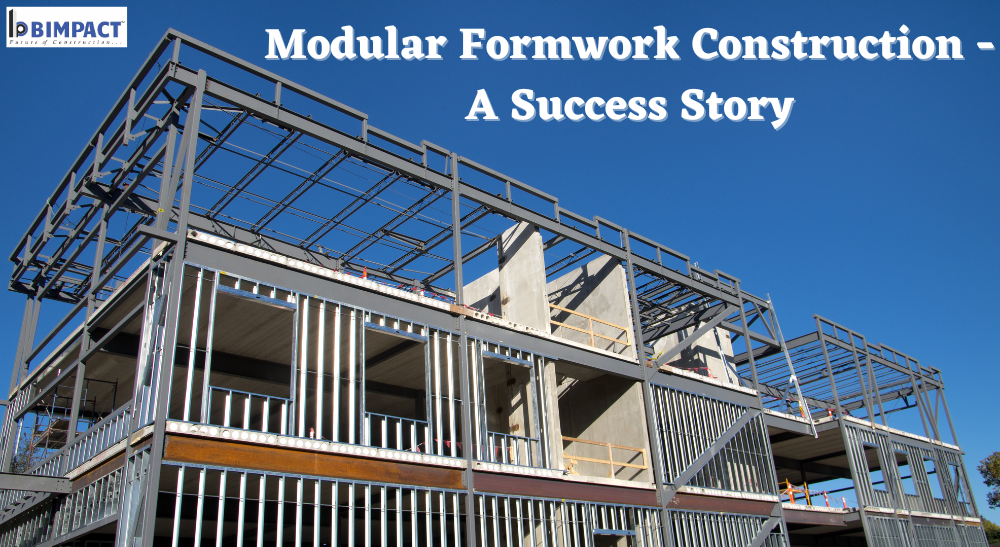Phone: (IN) +91 80035 33335 (USA) +1 720 800 8859 Email: info@bimpactdesigns.com
Modular Formwork Construction – A Success Story

Modular formwork construction has emerged as a game-changer in the realm of modern construction practices, revolutionizing the way structures are built. This innovative approach offers numerous benefits over traditional formwork systems, including increased efficiency, cost savings, and enhanced safety measures. By breaking down the construction process into modular components that can be easily assembled and disassembled, modular formwork systems have paved the way for greater productivity and quality control on construction sites.
In this article, we delve into the success story of modular formwork construction, exploring its advantages, key considerations for implementation, innovations, sustainable practices, best practices for efficiency, and the future outlook for this dynamic construction method.
Introduction to Modular Formwork Construction
The Concept of Modular Formwork
Modular formwork construction involves using pre-assembled formwork elements that can be easily interconnected and adjusted to form various shapes and sizes for concrete structures.
Benefits of Modular Versus Traditional Formwork
Compared to traditional formwork methods, modular formwork offers quicker installation, efficient material use, and increased adaptability to different project requirements.
Advantages of Using Modular Formwork Systems
Increased Efficiency and Cost Savings
Modular formwork systems streamline construction processes, reducing labor costs and project timelines. The reusable nature of modular components also contributes to long-term cost savings.
Enhanced Safety and Quality Control
By providing standardized formwork elements, modular systems promote consistency and precision in construction. This, in turn, enhances safety on-site and ensures the quality of the finished concrete structures.
Key Considerations for Implementing Modular Formwork
Project Planning and Design Integration
Proper planning and seamless integration of modular formwork into the project design are critical to maximizing its benefits, ensuring smooth execution, and achieving optimal results.
Training and Skill Development
Providing adequate training to construction teams on the proper usage of modular formwork systems is essential for harnessing their full potential and guaranteeing safe and efficient construction practices.
Innovations and Trends in Modular Formwork Construction
Technological Advancements in Modular Systems
Modular formwork construction has embraced technological advancements, from digital design tools to prefabricated components. Builders now use software for precise formwork design and customization, streamlining the construction process. Additionally, the integration of automation and robotics in formwork assembly has enhanced efficiency and accuracy on-site.
Sustainable Materials and Practices
Sustainability is a key focus in modular formwork construction, with a shift towards eco-friendly materials and practices. Builders are increasingly using recycled materials for formwork production and adopting green construction methods like rainwater harvesting and renewable energy sources. This sustainable approach not only benefits the environment but also reduces costs in the long run.
Sustainable Practices in Modular Formwork Construction
Environmental Impact and Waste Reduction
Sustainable practices in modular formwork construction aim to minimize the environmental impact of building projects. By optimizing material usage and implementing efficient waste management systems, construction sites can reduce landfill waste and lower carbon emissions. Strategies such as using reusable formwork systems and implementing recycling programs contribute to a greener construction industry.
Energy Efficiency and Resource Conservation
Energy efficiency is a crucial aspect of sustainable construction practices. Modular formwork construction is increasingly incorporating energy-saving technologies, such as solar panels and energy-efficient lighting systems, to reduce overall energy consumption. By prioritizing resource conservation and utilizing sustainable building materials, the construction industry is moving towards a more environmentally conscious future.
Best Practices for Maximizing Efficiency and Quality
Collaboration and Communication Strategies
Effective collaboration and communication are essential for maximizing efficiency in modular formwork construction projects. Establishing clear channels of communication between project stakeholders, including architects, engineers, and contractors, ensures smooth coordination and timely decision-making. By fostering a collaborative environment, construction teams can streamline processes and deliver high-quality results.
Quality Assurance and Performance Monitoring
Maintaining quality standards is paramount in modular formwork construction. Implementing rigorous quality assurance measures, such as regular inspections and performance monitoring, helps identify potential issues early on and ensures adherence to project specifications. By prioritizing quality control throughout the construction process, builders can deliver structures that meet safety standards and exceed client expectations.
Future Outlook for Modular Formwork in the Construction Industry
Market Trends and Growth Opportunities
The future of modular formwork in the construction industry looks promising, with growing demand for efficient and sustainable building solutions. Market trends indicate an increasing preference for modular construction methods due to their cost-effectiveness and time-saving benefits. As technology continues to advance and sustainability becomes a priority, modular formwork is poised to play a significant role in shaping the future of construction.
Potential Challenges and Areas for Improvement
Despite its many advantages, modular formwork construction still faces challenges that require attention for further improvement. Issues such as standardization of modular systems, scalability of designs, and skilled labor shortages pose potential obstacles to widespread adoption. Addressing these challenges through innovation, training programs, and industry collaboration will be crucial in unlocking the full potential of modular formwork in the construction sector.
In conclusion, modular formwork construction stands as a testament to the power of innovation and efficiency in the construction industry. As we witness the continued evolution of modular systems, fueled by advancements in technology and a growing emphasis on sustainability, it is clear that this method will play a pivotal role in shaping the future of construction. By embracing the principles of modular formwork and implementing best practices, construction professionals can unlock new levels of productivity, quality, and environmental responsibility in their projects. The success story of modular formwork construction is far from over, promising a bright and transformative future for the built environment.
